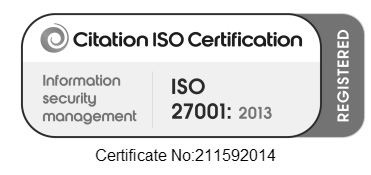Molesworth case study
Molesworths is a firm of solicitors in Rochdale that has been providing legal advice to the local community for more than 180 years.
The company supports businesses and individuals with legal problems and major transactions, from a house move or relationship breakdown to an employment issue or business sale.
Challenge
Molesworths’ existing IT infrastructure was nearing the end of its useful life. Among other issues, the servers were old and almost out of support, and connectivity was unreliable. A relocation to new premises presented the ideal opportunity for the firm to revamp its IT.
However, it was not a simple case of ‘out with the old, in with the new.’ Moving is one of the most stressful events in people’s lives, and relocating to a new office is no different, especially when your new ‘home’ – a former bank – is Grade II listed and has been vacant for years.
Unforeseen problems with the building delayed the move and IT go-live dates multiple times. Conservation issues, including the discovery of bats in the roof, caused delays in the renovation work. Progress was also stalled by the age of the building, specifically the thickness of the walls, which presented challenges when it came to installing fibre.
Solution
However, Central’s meticulously planned, phased approach helped minimise the impact of the disruption. The upgrade was rolled out over two years, with only the final elements completed in the weeks and days before the physical move.
“There was no big bang,” says Central Client Director Mike Dunleavy.
“It wasn’t a case of ‘we show up on Monday, we’re in a new office, and we have all these new IT systems to contend with.’ We factored in the main changes before the physical move, which removed a lot of the pain for the users.”
Central upgraded the company’s server infrastructure and migrated its data to Central’s private cloud service in a local tier-three data centre, significantly increasing physical and virtual security and improving performance and resilience.
An upgrade to a Cisco Meraki enterprise solution enhanced connectivity and provided better control over guest access, an important safeguard when clients visit the office.
Completing the refresh, Central upgraded the hardware used by Molesworths’ 30+ staff and installed a new VoIP telephone system.
Outcome
Throughout the project, Central overcame the challenges posed by the move to deliver the best possible outcome for Molesworths. Dunleavy recalls juggling the changing dates to ensure that the company had the connectivity it needed without paying for it twice – in both the old and new buildings.
The result has been a smooth transition to a high-performing IT system that complements Molesworths’ smart new high street presence and can support its business needs for the foreseeable future. Its new set-up has significantly improved security, performance and speed, with an Internet connection that is ten times faster than in the old office.
Paul Dixon, one of the partners at Molesworths, says, “Our move to new offices was a significant project that called for a more advanced IT system, and that’s exactly what Central has delivered. We now have a modern set-up that’s efficient, stable, secure and fit for the future delivery of legal services.
“Aside from Central’s IT expertise, their flexibility was exceptional. We had to postpone the go-live date three times due to various issues with the refurbishment, but Central took it all in their stride. Their can-do attitude and ability to adapt meant one less headache at a stressful time. They are also great people to work with.”
With the digital landscape constantly evolving, cyber security must be at the forefront of any IT strategy. Central has recently partnered with AppCheck, an automated penetration testing tool. The partnership will ensure Centrals clients are leading the way within their industry for security standards.
Why Cyber Security Is More Crucial Now Than Ever
The digital era has brought about an increase in cyber threats, making businesses of all sizes potential targets with the latest Verizon data breach report highlighting exploitation of vulnerabilities as one of the primary factors an attacker would use to gain access to an organisation. Thorough and consistent vulnerability assessments are the best solution for staying ahead of potential breaches. AppCheck Offers an automated solution to regularly test and identify vulnerabilities making it essential in a businesses cyber defence strategy.
The Power of AppCheck: Comprehensive Cybersecurity at Your Fingertips
AppCheck stands out with its comprehensive scanning platform covering your whole infrastructure created by penetration testing experts. This gives businesses the tools they need to identify and rectify vulnerabilities in there IT effectively.
Enhanced Vulnerability Detection and Management
The platform offers an extensive set of features including website/web application, API and network infrastructure vulnerability testing. With the ability to schedule scans businesses can ensure they are detecting and addressing security issues, maintaining a strong defence against cyber threats. Rescan capabilities ensure that your remediation was successful and there is no longer a risk to your business.
Your Next Step in Cybersecurity
Central's partnership with AppCheck aligns with our commitment to providing future-proof, comprehensive IT solutions to our clients.
Don't wait for a cyber threat to expose your vulnerabilities. Strengthen your defences now with the advanced, automated penetration testing services provided by Central and AppCheck.
Contact us today to schedule your AppCheck demo, to conduct a free vulnerability assessment with AppCheck and take your cybersecurity to the next level.
Recently in Housing Executive our operations director John Blackburn outlined some of the biggest IT challenges facing the social housing sector and the role that outsourcing could play in resolving them.
When it comes to IT provision, housing associations (HAs) aren’t known for their big budgets, and there is increasing pressure to streamline systems and demonstrate greater return on investment. However, privy to large amounts of sensitive data, they still need access to high-quality, robust tech support.
Achieving budgetary and operational efficiency
Managing a range of complex, integrated systems and portals is no easy task for social housing IT professionals. And with an increasing number of daily help desk tickets being raised — comprising login queries, authentication issues, antivirus questions, and more — everything can rapidly feel like a competing priority.
Enlisting the help of an experienced IT partner — whether for help desk requests and security, or larger technology integration and transition projects — can bring significant financial and operational benefits.
Offering the ability to scale up or down as required, it means housing associations have the support they need, and only pay for what they require at that moment in time – with the guarantee that the resource will be readily available.
It is commonly misconceived that outsourcing IT replaces in-house teams. The reality is the two can, and should, complement and enhance one another. With external assistance, internal teams can afford the time and headspace to focus on the core business applications and tactical future of the HA’s tech stack, without getting engrossed in help desk issues.
Overcoming recruitment challenges
The shortage of high-level talent within IT teams and beyond is a growing concern for social housing organisations across the UK. Not having the right personnel in place can greatly impede growth, stifle efficiencies and productivity, and result in spiralling recruitment fees. And this will remain a reality if a solution is not found.
To help avoid skills shortages within technology departments, outsourced teams could hold the answer – whether temporarily or permanently.
As experienced specialists who are highly skilled in their role, they can be engaged at short notice to bring an immediate solution to an urgent project need. Furthermore, outsourced teams regularly work across a spectrum of clients and industries, which means they can use knowledge and learnings from other projects to help quickly solve persistent issues.
Ensuring a strong security posture
The dramatic shift to more flexible, hybrid, and digitally focused ways of working means that effective cyber security strategies are essential — enabling full visibility over software and hardware updates, antivirus technology, firewalls, Virtual Private Networks (VPNs), and more. But it also affords more secure access control – ensuring only authorised personnel within the organisation can gain entry to sensitive data.
Specialist outsourced IT support can also work with housing associations to improve the performance of virtual and physical servers, including when they should be backed up and at what frequency — whilst also devising a robust recovery plan. This details the steps to be taken to regain access and functionality to IT infrastructure — following events such as natural disasters, cyber-attacks, or business disruptions. For example, in the case of a hacking attempt, what data protection measures will the recovery team have in place to respond?
By having processes and procedures for a disaster recovery plan set up, and regularly testing and optimising security and data protection strategies, social housing providers can successfully navigate such challenges.
Obtaining peace of mind
Against the current backdrop of IT-resource challenges and economic uncertainty, having the flexible, specialist support of outsourced IT can not only alleviate some of the burden but boost efficiency too – providing housing associations with the peace of mind that their IT infrastructure is fit for purpose both in the present and for the future.
In a digital-dependent world, the social housing sector is under more pressure than ever to streamline IT infrastructure, to ensure technology brings benefits across every department. So, what are the main IT challenges faced by the industry and, with limited financial resources, how can you tackle them head on?
Our operations director, John Blackburn, outlines some key IT hurdles and how working with a trusted technology partner can help you overcome them.
Challenge 1: Reliable IT infrastructure
A strong IT infrastructure is essential for success. Outdated legacy software could mean your IT network is underperforming, be unsuitable for your evolving needs, and have flaws leading to several hidden security risks.
Before upgrading or replacing infrastructure, you first need to gain an accurate picture of what infrastructure you currently have, what works well, and what needs improving – along with being clear on what the end-goal looks like.
Challenge 2: Security threats
Sadly, every organisation is likely to encounter a security threat at some point, whether through natural disaster, or for personal data through phishing, hacking or malware that seeks to disrupt the information technology infrastructure. Therefore, being able to keep networks protected should be a priority for IT teams – no matter where staff are located.
Challenge 3: Backup and disaster recovery
Your data is one of the most valuable assets your organisation has. If that data is lost, it could have devastating effects for your reputation, operations, and bottom line. Therefore, it is essential that you have a reliable disaster recovery plan in place. This details the steps to be taken to regain access and functionality to IT infrastructure after events like a natural disaster, cyber-attack, or business disruption.
By having processes and procedures in place, and regularly testing and optimising security and data protection strategies, social housing providers can successfully navigate this challenge. While this might seem to be a complex or overwhelming task, with the support of trusted experts, implementing an effective backup and disaster recovery strategy will be stress free.
Challenge 4: Cost management in the cloud
Factors such as remote working, cyber security, data handling, and safe storage have led many housing associations to adopt cloud-based platforms over recent years to help them work seamlessly and securely. Cloud subscriptions are a significant expenditure within your IT budget, and if you’re not organised in your approach to using it, you risk losing control of your cloud spend.
As usage increases across different teams and departments, the overheads of using the chosen platform can grow rapidly. In addition, Microsoft recently implemented an extensive shake-up of its software licensing arrangements, with a price increase on some of its most popular subscriptions.
To control costs, housing associations should tap into the expertise of a trusted IT partner who can help you understand the difference between the various cloud management systems and licence options available. They can also help you save money on maintenance, unused services, or unnecessary add-ons, to get the best out of your cloud management platform.
Challenge 5: Having a clear IT strategy
Straightforward implementation of IT systems can pave the way for cost-savings, modernisation, and agile working. It’s vital that all elements work together, and that you have a roadmap for your technical approach, to prepare your business for future challenges and support scaling operations. Having a technology partner who specialises in consultancy services will provide clarity and direction for your strategy.
If you need assistance overcoming any of these IT challenges, get in touch with Central Networks today. We pride ourselves on being a strategic technology partner with a human touch — making IT stress free. You can also find out more about the projects we’ve worked on with other social housing providers, here!
With such a relentless number of pressures facing organisations across the UK, settling into the pattern of another new year isn’t the only challenge right now. But navigating such a multifaceted role means the stakes are particularly high for the social housing sector.
As well as managing everything from recruitment challenges and already stretched IT budgets, to the effects of ongoing geopolitical turmoil, the responsibility to serve a growing demographic with specialist properties and support continues. Having traditionally been reluctant to adapt to technological innovation, the sector is still battling with inefficient — and often redundant — legacy infrastructure too.
But it’s not just about wholesale change. By shifting priorities and opening doors to greater opportunities, social housing organisations can drive powerful progress over the coming months. Here, client director at Central Networks, Mike Dunleavy, explores which IT advancements will have the biggest impact in 2023…
Expecting and accepting downtime
With the increasing proliferation of cyber attacks, it’s only natural to feel overwhelmed by the possibility of downtime – not least with the oft-cited statistic looming, which states that £3.6m could be lost by organisations each year as a result.
Of course, there are so many reasons for IT to become momentarily out of use – from malicious malware downloads, to natural disaster strikes, general human error, and more. But accepting these feats as inevitable means shaking responsibility altogether.
By instead taking a proactive approach to maintenance, housing associations can prevent unprecedented cyber attacks in their infancy, minimise unproductive work hours, protect costs, plus safeguard company reputation amongst customers, partners, and stakeholders alike. Above all else, foolproof training procedures must take centre stage this year — ensuring teams feel empowered to spot potentially risky nuances in the network.
Overlooking the benefits of outsourced IT support
Talent attraction and retention is a major concern for all organisations. But with the growing lack of resource, economic struggles, and nationwide digital skills shortage, housing associations are under increasing pressures.
The return on investment offered by outsourcing key IT needs – such as help desk support and proactive network maintenance – is well worth its weight in gold. Not only do specialist teams offer years of experience, spanning a variety of industries, they also often boast lower costs, and enable you to focus internal resources on your core business strategy.
Paying for redundant tech
Digital transformation needs are evolving constantly. And without a CTO or finance team in place to focus on the strategic future of your housing association, a lot of organisations will find themselves running into trouble – implementing knee-jerk, sticking plaster solutions that serve limited long-term purpose.
With both finances and human resources stretched in countless directions, the pressure to introduce the fastest and cheapest fixes into the tech stack is immense. But what many IT leaders also forget when solving organisational challenges, is that future growth must be taken into consideration too.
A major part of this strategy, is to invest in infrastructure that’s truly scalable. In being able to flex up and down as required, firms won’t risk overspending on overprovisioned technology – because it will grow in line with evolving business needs.
Assuming that productivity is a given
With a limited number of resources to tap into, housing associations are navigating the need to do more with less. And the current economic backdrop, coupled with rising recruitment pressures, means this feat will only become more of a challenge in 2023.
Ensuring the right infrastructure is in place will be a major driver of productivity. Being technologically savvy is not a given, for example – no matter how digital our world has become. So, will the new ways of working suit your employees? And will the right support be in place to help with a seamless transition?
Failing to replace legacy infrastructure
Like many industries, archaic legacy systems are seriously hampering growth in the social housing sector. As well as being costly to maintain and worse for the environment, they’re often incredibly unreliable – not to mention dangerously unsecure.
Most of the time, IT leaders and CFOs are well aware of this. However, the prospect of mapping out a well-considered digital transformation project is often far too daunting. This is an issue that will only grow in severity over time, so appointing the right support to facilitate such a transition – optimising infrastructure, whilst keeping costs as low as possible, and minimising the risk of downtime – is crucial this year, if not done already.
Further procrastination will simply not suffice, unless organisations want to place business continuity, cyber security, team productivity, and customer satisfaction at greater risk.
Keen to continue this conversation? Central Networks is an outsourced IT partner, specialising in realms spanning cloud services and digital security, to managed help desk support, strategic consultancy, and more. Simply get in touch, to see how we can help drive your social housing firm forward – in 2023, and beyond.
You can see how we’re supporting the likes of Welsh housing association ateb Group, and provider of housing and community services, One Manchester, by visiting our sector page.






Central Networks are a strategic technology partner. Excellent technology is a given, customer service, trust and long-term relationships are what drive our business. We support CEOs, Heads of IT, IT technicians and transformation directors to ensure technology provides an edge to their organisations.
Company No: 02604843
VAT: GB 562 6919 13